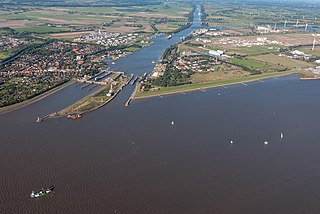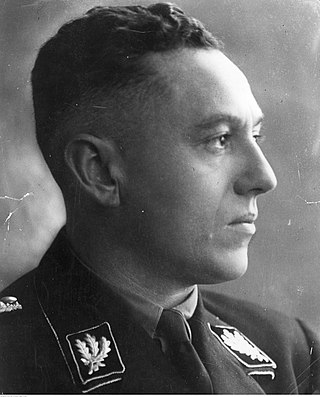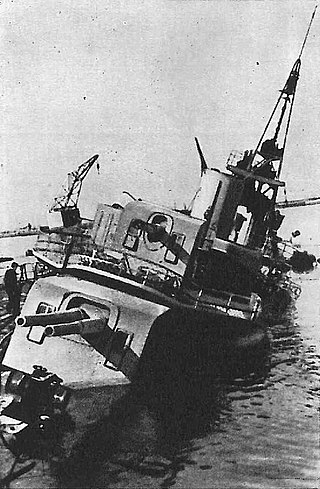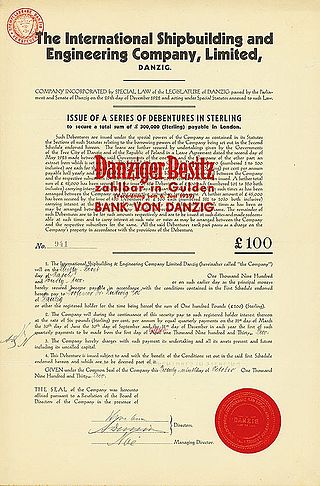Related Research Articles

The Kiel Canal is a 98 km (61 mi) long freshwater canal in the German state of Schleswig-Holstein. The canal was finished in 1895, but later widened, and links the North Sea at Brunsbüttel to the Baltic Sea at Kiel-Holtenau. An average of 460 km (290 mi) is saved by using the Kiel Canal instead of going around the Jutland Peninsula. This not only saves time but also avoids storm-prone seas and having to pass through the Danish straits.

The Permanent Court of International Justice, often called the World Court, existed from 1922 to 1946. It was an international court attached to the League of Nations. Created in 1920, the Court was initially well-received from states and academics alike, with many cases submitted to it for its first decade of operation.

The Treaty of Versailles was a peace treaty signed on 28 June 1919. As the most important treaty of World War I, it ended the state of war between Germany and most of the Allied Powers. It was signed in the Palace of Versailles, exactly five years after the assassination of Archduke Franz Ferdinand, which led to the war. The other Central Powers on the German side signed separate treaties. Although the armistice of 11 November 1918 ended the actual fighting, and agreed certain principles and conditions including the payment of reparations, it took six months of Allied negotiations at the Paris Peace Conference to conclude the peace treaty. Germany was not allowed to participate in the negotiations before signing the treaty.

The Free City of Danzig was a city-state under the protection and oversight of the League of Nations between 1920 and 1939, consisting of the Baltic Sea port of Danzig and nearly 200 other small localities in the surrounding areas. The polity was created on 15 November 1920 in accordance with the terms of Article 100 of the 1919 Treaty of Versailles after the end of World War I.

Albert Maria Forster was a Nazi German politician, member of the SS and war criminal. Under his administration as the Gauleiter and Reichsstatthalter of Danzig-West Prussia during the Second World War, the local non-German populations of Poles and Jews were classified as sub-human and subjected to extermination campaigns involving ethnic cleansing, mass murder, and in the case of some Poles with German ancestry, forceful Germanisation. Forster was directly responsible for the extermination of non-Germans and was a strong supporter of Polish genocide, which he had advocated before the war. Forster was tried, convicted and hanged in Warsaw for his crimes, after Germany was defeated.

The Battle of Danzig Bay took place on 1 September 1939, at the beginning of the invasion of Poland, when Polish Navy warships were attacked by German Luftwaffe aircraft in Gdańsk Bay. It was the first naval-air battle of World War II.

Nowy Staw is a small town in northern Poland on the Święta river in the Żuławy region, with 3 766 inhabitants (2022), situated in Malbork County in the Pomeranian Voivodeship. The name of the town means New Pond.

The Defence of the Polish Post Office in Danzig (Gdańsk) was one of the first acts of World War II in Europe, as part of the September Campaign. On 1 September 1939 the Invasion of Poland was initiated by Germany when the battleship Schleswig-Holstein opened fire on the Polish-controlled harbor of Danzig, around 04:45–48 hours. Danzig paramilitaries and police, supported by Germany, immediately joined the offensive to take full control of the city, by capturing the Polish post office. Polish personnel defended the building for some 15 hours against assaults by the SS Heimwehr Danzig, local SA formations and special units of Danzig police. All but four of the defenders, who were able to escape from the building during the surrender, were sentenced to death by a German court martial as illegal combatants on 5 October 1939, and executed.

Dionisio Anzilotti was an Italian jurist and judge of the Permanent Court of International Justice.
The Black Reichswehr was the unofficial name for the extra-legal paramilitary formation that was secretly a part of the German military (Reichswehr) during the early years of the Weimar Republic. It was formed in 1921 after the government banned the Freikorps that it had relied on until then to supplement the Reichswehr. General Hans von Seeckt thought that the Reichswehr no longer had enough men available to guard the country's borders, but the army could not be expanded because of the manpower restrictions imposed on it by the Treaty of Versailles. In order to circumvent the limitation, Seeckt created the Black Reichswehr as purportedly civilian "labour battalions" attached to regular Reichswehr units. The Arbeitskommandos received military training, provisioning and orders from the Reichswehr, although ultimately they were never involved in military action. The Black Reichswehr reached a peak membership estimated at 50,000 to 80,000 in 1923 and was dissolved the same year after a group of its members launched the failed Küstrin Putsch. Its existence became widely known in 1925 when its practice of Fememord, the extra-judicial killing of "traitors" among its ranks, was revealed to the public.

Danziger Werft was a shipbuilding company, in Danzig, in what was then the Free City of Danzig. It was founded in 1921 on the site of the former Kaiserliche Werft Danzig that had been closed after World War I.

The Minority Treaties[a] are treaties, League of Nations mandates, and unilateral declarations made by countries applying for membership in the League of Nations that conferred basic rights on all the inhabitants of the country without distinction of birth, nationality, language, race or religion. The country concerned had to acknowledge the clauses of the treaty as fundamental laws of state and as obligations of international concern placed under the guarantee of the League of Nations. Most of the treaties entered into force after the Paris Peace Conference.

Carl Jacob Burckhardt was a Swiss diplomat and historian. His career alternated between periods of academic historical research and diplomatic postings; the most prominent of the latter were League of Nations High Commissioner for the Free City of Danzig (1937–39) and President of the International Committee of the Red Cross (1945–48).

The Leipzig war crimes trials were held in 1921 to try alleged German war criminals of the First World War before the German Reichsgericht in Leipzig, as part of the penalties imposed on the German government under the Treaty of Versailles. Twelve people were tried, and the proceedings were widely regarded at the time as a failure. In the longer term, they were seen by some as a significant step toward the introduction of a comprehensive system for the prosecution of international law violations.

The Klaipėda Convention was an international agreement between Lithuania and the countries of the Conference of Ambassadors signed in Paris on May 8, 1924. According to the convention, the Klaipėda Region became an autonomous region under unconditional sovereignty of Lithuania.

SMS Berlin was the second member of the seven-vessel Bremen class of light cruisers, built for the German Kaiserliche Marine in the early 1900s. She and her sister ships were ordered under the 1898 Naval Law that required new cruisers be built to replace obsolete vessels in the fleet. The design for the Bremen class was derived from the preceding Gazelle class, utilizing a larger hull that allowed for additional boilers that increased speed. Named for the German capital of Berlin, the ship was armed with a main battery of ten 10.5 cm (4.1 in) guns and had a top speed of 22 knots.

The Polish Post Office in the Free City of Danzig was created in 1920 and operated until the German invasion of Poland that marked the beginning of World War II.

Hans-Adolf Helmuth Ludwig Erdmann Waldemar von Moltke was a German landowner in Silesia who became a diplomat. He served as ambassador in Poland during the Weimar Republic and the Third Reich. After the German invasion of Poland, he became Adolf Hitler's ambassador in Spain during the Second World War.
The following events occurred in July 1939:

The Danzig crisis of 1932 was an incident between the Free City of Danzig and Poland concerning whether the Polish government had the right to station warships in Danzig harbour, together with Poland's claim to represent Danzig with foreign powers. The incident was sparked on 14 June 1932 when a squadron of British destroyers visited Danzig and was greeted by the Polish destroyer Wicher which had entered Danzig harbour without the permission of the Senate of the Free City. The incident led to the Danzig authorities reluctantly ceding the right of Poland to station its warships in Danzig, the renewal of the agreement governing Polish rights in the Free City and within Poland a shift towards navalism.
References
- ↑ Summaries of Judgments, Advisory Opinions and Orders of the Permanent Court of International Justice, S.S. Wimbledon
- ↑ Permanent Court of International Justice, Case of the S.S. Wimbledon